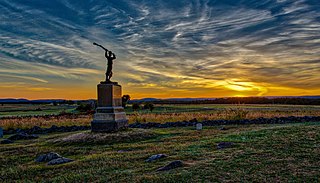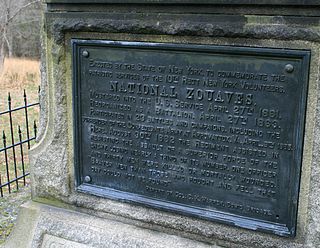
The 69th Pennsylvania Infantry was an infantry regiment in the Union army during the American Civil War.

The 72nd Pennsylvania Infantry was a volunteer infantry regiment which served in the Union Army during the American Civil War. It was part of the famous Philadelphia Brigade.
The 6th New Jersey Infantry Regiment was regiment of infantry from New Jersey that served in the Army of the Potomac during the American Civil War.

John Lafayette Riker was an American attorney and an officer in the Union Army during the American Civil War. He was killed in action at the Battle of Fair Oaks during the Peninsula Campaign.
The 19th Regiment Illinois Volunteer Infantry was an infantry regiment that served in the Union Army during the American Civil War. Three companies formerly with Col. Elmer Ellsworth's Zouave Cadets wore a zouave uniform consisting of a dark blue zouave jacket with red trimmings, red pants, leather gaiters, a sky blue shirt, red sash, and a red French styled kepi with a dark blue band. The jacket cuffs were trimmed in yellow-orange and red. Brass buttons went down both fronts of the jacket. They were organized into four separate companies on May 4, 1861, in Chicago. It was consolidated and mustered into Federal service as the 19th Illinois Volunteer Infantry on June 17, 1861. It was mustered out at Chicago on July 9, 1864.

The 14th Regiment New York State Militia was a volunteer militia regiment from the City of Brooklyn, New York. It is primarily known for its service in the American Civil War from April 1861 to 6 May 1864, although it later served in the Spanish–American War and World War I.

The 39th New York Infantry Regiment, known as the "Garibaldi Guard" after the Italian revolutionary, Giuseppe Garibaldi, was an infantry regiment that served in the Union Army during the American Civil War.

The 5th New York Veteran Infantry Regiment was an Infantry Regiment that served in the Union Army during the American Civil War. The regiment was known as "Duryée‘s Zouaves." The regiment had two uniforms during its time. The first uniform consisted of a medium blue zouave jacket with red trimming, a grey shirt, a red sash with sky blue trimming, red chasseur trousers with yellow piping, a red fez with a yellow tassel, and a white turban. The second and official uniform consisted of a dark blue zouave jacket with red trimmings in the Hawkin Zouave design, a dark blue zouave vest with red trimming, baggy red trousers, a red sash with sky blue trimming,a red fez with a yellow tassel, and a white turban.

The 44th New York Infantry Regiment was a regiment of the Union Army during the American Civil War which was formed up in mid-1861, and mustered in on August 30, 1861. The regiment wore an americanized zouave uniform which consisted of a dark blue zouave jacket with red piping on the cuffs, dark blue trousers with a red stripe, a red zouave shirt, a dark blue forage cap, and a pair of leather gaiters. The jacket had buttons down the front of it which was not part of the original French zouave uniform.

The 73rd New York Infantry Regiment was an infantry regiment of Union Army in the American Civil War. The regiment was organized in New York City in May 1861, originally under the designation the Fourth Excelsior Regiment, as a Zouave regiment, known for its unusual dress and drill style. The uniform worn by this regiment consisted of a dark blue chasseur jacket with light blue trim and light blue trefoils on each sleeve, sky blue chasseur trousers with two white stripes down each leg, brown leather gaiters, a light blue kepi with a dark blue band and dark blue piping, and a red Zouave fez with a blue tassel as a fatigue cap. Drawn from the ranks of the city's many volunteer fire companies, the unit was known alternately as the Second Fire Zouaves, after the 11th New York was known as the First Fire Zouaves, and they were also known as the Excelsior Zouaves. Some of the men wore the brass letters "E Z" on the bands of their kepis. Many artists have depicted this regiment also with red shirts with the collar sticking out over the jacket creating a "red collar."
David John Nevin was an American officer in the Union Army during the American Civil War.

The 9th New York Infantry Regiment was an infantry regiment that served in the Union Army during the American Civil War. It was also known as the "Hawkins' Zouaves" or the "New York Zouaves."

The 10th New York Infantry Regiment was an infantry regiment that served in the Union Army during the American Civil War. It was also known as the McChesney Zouaves or National Guard Zouaves.

The 140th New York Infantry Regiment was a volunteer infantry regiment that was created on September 13, 1862, for the Union Army during the American Civil War. From January 1864 they wore a Zouave uniform.

The 114th Regiment, Pennsylvania Volunteer Infantry was an infantry regiment that served in the Union Army during the American Civil War. They were notable for their colorful Americanized version of the Zouave uniform worn in emulation of certain French light-infantry units that became world-famous during France's colonization of North Africa, the Crimean War, and the Second War of Italian Independence fought in the years prior to the American Civil War.

The 41st New York Infantry Regiment was an infantry regiment that served in the American Civil War. They were nicknamed De Kalb Regiment. The regiment was formed from German immigrants from both New York and Pennsylvania.

The 155th Pennsylvania Volunteer Infantry Regiment was a Federal infantry regiment that served in the American Civil War in the Army of the Potomac in the Eastern Theater of the conflict.

The 74th New York Infantry Regiment was a Union regiment recruited in 1861, during the American Civil War. The regiment was part of Sickles' Excelsior Brigade and their first commander was sailor and engineer COL Charles K. Graham.

The 64th New York Infantry Regiment, the "First Cattaraugus Regiment", was an infantry regiment of the Union Army during the American Civil War.

The 53rd New York Volunteer Infantry Regiment, also known as D'Epineuil's Zouaves or the Poughkeepsie Boys was an infantry unit of the Union Army organised in New York City for service in the American Civil War.











